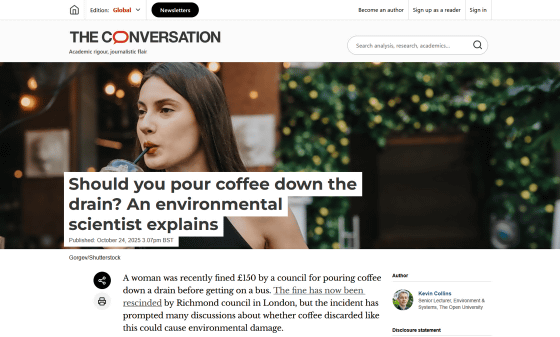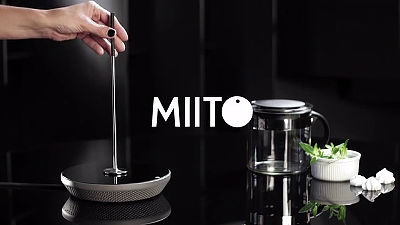Why scientists say you shouldn't pour coffee down the drain

If you bought a cup of coffee in the street but couldn't finish it, or if you had an emergency and needed to free up your hand, you may have had no choice but to throw it down the drain. However,
Should you pour coffee down the drain? An environmental scientist explains
https://theconversation.com/should-you-pour-coffee-down-the-drain-an-environmental-scientist-explains-268236

◆Should you not pour coffee down the drain?
In 2025, a London woman was fined £150 for dumping her coffee down the drain before boarding a bus. The fine was later rescinded, but the incident sparked a debate about whether dumping coffee is environmentally damaging.
According to Collins, around 98 million cups of coffee are consumed per day in the UK, and around 2 billion cups worldwide. The caffeine in these cups can be a welcome wake-up call for those looking to ward off drowsiness and feel alert, but discarding leftover coffee can cause problems for rivers and waterways.
The problem with disposing of coffee down the drain is the existence ofcombined sewers , which send stormwater from streets and domestic wastewater to a wastewater treatment plant through a single pipe. Most of the UK has combined sewers, and the more coffee that flows into these pipes, the greater the chance that caffeine and other chemicals will not be adequately treated and will end up in rivers and streams. Caffeine, in particular, is difficult to break down and is therefore considered an emerging pollutant. As of 2003, caffeine has been shown to contaminate lakes and rivers in Switzerland.
Collins also said that coffee, even decaffeinated, should not be poured down the drain. Coffee lowers the pH of all water and contains compounds that deplete oxygen from the water as it decomposes. Furthermore, the nutrients in coffee can encourage algae growth, accelerating oxygen depletion in rivers and lakes, Collins said.

◆Why is caffeine a problem?
Some people may think that pouring coffee down the drain is not a problem as long as it is eventually sent to a sewage treatment plant. However, the caffeine treatment capacity of sewage treatment plants varies depending on the type and design of the treatment plant, the season, temperature, and other factors, and
Furthermore, combined sewer systems are designed to flush untreated sewage directly into rivers and waterways when the sewer pipes reach their capacity due to heavy rain or other reasons, preventing sewage from flooding homes and businesses. This means that whether you dump your coffee down a city drain or your kitchen sink, some of the caffeine ends up in rivers and oceans.
Caffeine contamination of water bodies is already a problem around the world, and a 2021 study of 258 rivers in 104 countries found that caffeine was detected in more than 50% of the sampled sites. Recent studies have shown that caffeine can affect the metabolism, growth, and motility of some freshwater algae, plants, and aquatic insects, leading to their death, and that caffeine can have an adverse effect on marine life.

What should you not throw down the drain?
If your area has a separate sewer system, where the wastewater pipes are separate from the stormwater pipes, the liquid you pour down your sink will be sent to a sewage treatment plant. However, in areas with a combined sewer system, it doesn't make much difference whether you pour the liquid down your sink or down a drain.
Collins therefore urges people to 'put anything down the drain that you don't want in our rivers, lakes, beaches or oceans. This means things like coffee, coffee grounds, food-based liquids, oil, paint, hot grease, detergent, bleach and building waste into the appropriate household bin or waste collection centre.'
If you regularly throw away leftover coffee, consider reducing the amount of coffee you make in the first place. Also, if the coffee doesn't contain milk or sugar, you can dilute it and use it as a plant supplement. Coffee grounds can also be used as fertilizer to increase the organic matter content in soil.
Some municipalities allow you to flush coffee grounds down the sink. For example, Kurobe City in Toyama Prefecture has a system in place to convert coffee grounds contained in sewage into fuel for power generation, and the city's official website asks, 'Citizens of Kurobe! Why not try flushing your coffee grounds from your sink down the sewer?'
Coffee grounds are dumped into the sewer (a decarbonization initiative) | Kurobe City
https://www.city.kurobe.toyama.jp/news/detail.aspx?servno=32618
Related Posts:







